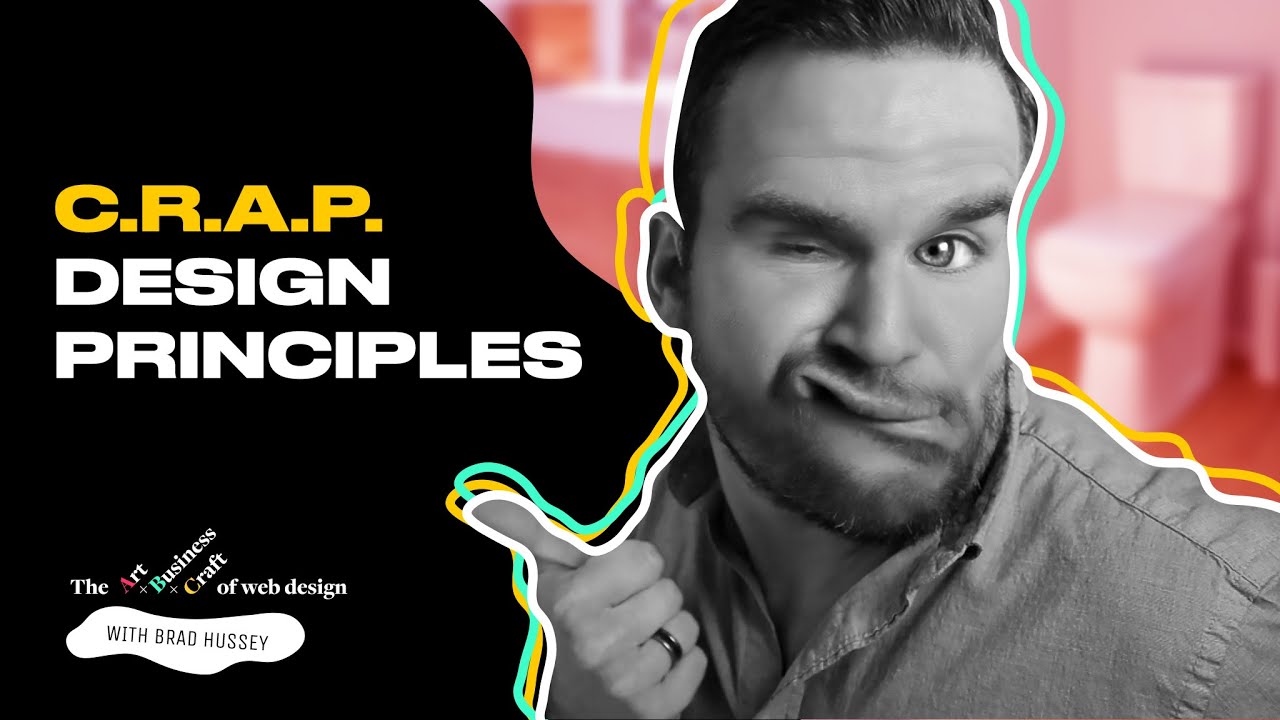4 Foundational UI Design Principles | C.R.A.P.
Summary
TLDRThis video outlines four foundational design principles essential for UI designers, encapsulated in the acronym CRAP: Contrast, Repetition, Alignment, and Proximity. Each principle is explained with practical examples, highlighting how contrast enhances visual interest and hierarchy, repetition fosters consistency, alignment creates order, and proximity groups related elements for clarity. By mastering these principles, designers can transform their layouts from ordinary to extraordinary, ensuring that their designs are not only visually appealing but also user-friendly. The video encourages viewers to apply these principles in their work for improved design outcomes.
Takeaways
- 😀 Understanding the four foundational design principles—Contrast, Repetition, Alignment, and Proximity (C.R.A.P.)—is crucial for effective UI design.
- 🎨 Contrast helps organize designs by establishing hierarchy, emphasizing focal points, and adding visual interest through color, weight, size, and imagery.
- 🔁 Repetition enhances consistency, reduces user confusion, and makes it easier for users to learn the interface by creating a coherent structure.
- 📏 Alignment groups related elements, creates order, and helps in establishing a rhythm within the design, ensuring a cleaner look.
- 📐 Utilizing invisible axes for alignment can help maintain structure in both traditional and experimental layouts.
- 👥 Proximity establishes relationships between elements, making them appear as if they belong together and enhancing clarity.
- 🖌️ Increasing font size and weight can significantly improve contrast, making headlines more prominent and engaging.
- 🚲 Consistent positioning of images and text within a layout can transform a chaotic design into a more navigable interface.
- 📊 Applying these principles effectively can elevate the overall quality of designs, turning 'meh' into 'wow'.
- 👍 Mastering these foundational principles is essential for anyone aspiring to become a skilled UI designer.
Q & A
What is the acronym that represents the four foundational design principles discussed in the video?
-The acronym is C-R-A-P, which stands for Contrast, Repetition, Alignment, and Proximity.
How does contrast contribute to effective UI design?
-Contrast helps organize design elements, establish hierarchy, emphasize focal points, and add visual interest by using differences in color, size, weight, and imagery.
Can you give an example of how to create contrast in typography?
-An example of creating contrast in typography is by increasing the size of a headline compared to body text, such as changing it from 24 pixels to 54 pixels and making it semi-bold.
Why is repetition important in design?
-Repetition increases consistency and helps users learn the interface more easily, reducing confusion by establishing recognizable patterns and structures.
What is one way to implement repetition in a layout?
-One way to implement repetition is to ensure that similar elements, like buttons or image alignments, are consistently used across different pages or sections of a website.
What role does alignment play in UI design?
-Alignment organizes and groups design elements, creating rhythm and bringing order to chaos, which improves clarity and user navigation.
How can you effectively align elements in a design?
-You can effectively align elements by distributing them evenly, aligning text to a common edge, and ensuring that related items are grouped along invisible axes.
What is the principle of proximity in design?
-Proximity refers to the spatial relationship between elements; it groups related items together to imply connection and improve comprehension.
How can adjusting proximity enhance a layout?
-By adjusting the spacing between related elements, such as bringing buttons closer to their labels, you can make the layout feel more organized and easier for users to understand.
What overall impact do the CRAP principles have on design quality?
-Applying the CRAP principles leads to designs that are more visually appealing, easier to navigate, and more effective in communicating information.
Outlines

Esta sección está disponible solo para usuarios con suscripción. Por favor, mejora tu plan para acceder a esta parte.
Mejorar ahoraMindmap

Esta sección está disponible solo para usuarios con suscripción. Por favor, mejora tu plan para acceder a esta parte.
Mejorar ahoraKeywords

Esta sección está disponible solo para usuarios con suscripción. Por favor, mejora tu plan para acceder a esta parte.
Mejorar ahoraHighlights

Esta sección está disponible solo para usuarios con suscripción. Por favor, mejora tu plan para acceder a esta parte.
Mejorar ahoraTranscripts

Esta sección está disponible solo para usuarios con suscripción. Por favor, mejora tu plan para acceder a esta parte.
Mejorar ahoraVer Más Videos Relacionados

C.R.A.P. DESIGN PRINCIPLES | Free Web Design Tutorial 2021 | Lesson 1

5 SEGREDOS PARA O LAYOUT PERFEITO | DESIGNER INICIANTE (Composição e Layout)

Layout dan Komposisi Dalam Desain | Belajar Desain Grafis (5/6)

Beginning Graphic Design: Layout & Composition

Tata Letak (Layout) & Komposisi || Dasar Desain Grafis

PRINCÍPIOS de DESIGN GRÁFICO para INICIANTES
5.0 / 5 (0 votes)
